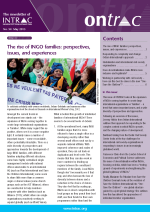This issue of ONTRAC looks at the expansion of NGOs coming together to create large international organisations or ‘families’ – a development trend that raises a number of important issues, and offers a wide diversity of perspectives and approaches. Following an overview from Brian Pratt, our four contributors each address different aspects of this trend.
together to create large international organisations or ‘families’ – a development trend that raises a number of important issues, and offers a wide diversity of perspectives and approaches. Following an overview from Brian Pratt, our four contributors each address different aspects of this trend.
Jeremy Hobbs from Oxfam International outlines their approach to responding to the complex context in which INGOs operate, and the changing nature of development.
Burkhard Gnärig from the Berlin Civil Society Center looks at the key challenges for international civil society organisations in responding to issues in an increasingly globalised world. He argues that, for three main reasons, today’s ICSOs rarely have the governance and management structures necessary for effective global intervention.
Francesco Obino from the London School of Economics and Political Science addresses the issue of decentralisation within INGOs, focusing on India, which has been a “testing ground of decentralisation and experiments in strengthening the global legitimacy of INGOs.”
Finally, Marianne Bo Paludan from Save the Children Denmark provides an account of the evolution of Save the Children International into “One-Save the Children” – one global structure guided by a joint global strategy. She outlines how this has altered the approach of individual member organisations.
Download:
ONTRAC 54: The rise of INGO families: perspectives, issues, and experiences
.pdf (0.36mb)
Download:
ONTRAC 54: The rise of INGO families: perspectives, issues, and experiences. Russian
.pdf (0.91mb)